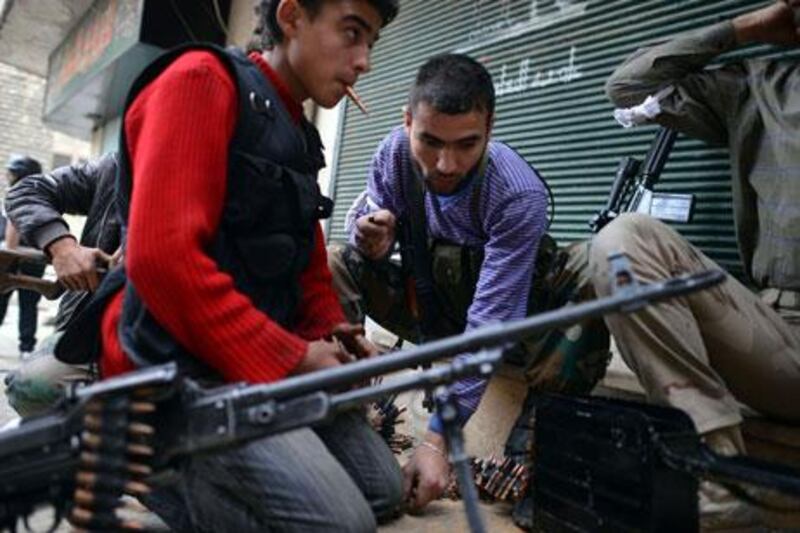Antakya, Turkey // Syrian rebels say they have been told access to weapons from Arabian Gulf states will be conditional on their pledging allegiance to the Free Syrian Army and its civilian overseers in the Syrian National Coalition.
The conditions are part of an effort to better organise the revolt against Bashar Al Assad and rein in Islamist militants.
The Free Syrian Army commander Gen Selim Idriss visited Gulf states last week to ask if the flow of weapons to the rebels could be increased.
The visits followed a decision by the Arab League last month authorising munitions supplies and amid a quickening diplomatic tempo as regional leaders head for Washington in coming weeks for talks on Syria,
Gen Idriss was told that arms supplies would increase only if a clearer chain of command and better organisation were established among the rebels.
Those conditions appear to have been set to make those fighting Mr Al Assad's powerful conventional army more effective, and, perhaps crucially, to bolster the FSA high command and the Syrian National Coalition.
Although the coalition has been accepted by Arab states and some international supporters of the uprising as the legitimate representatives of Syria, both it and the FSA have struggled to exert influence on the ground, where disparate and largely autonomous armed groups hold sway.
Only armed groups pledging allegiance to the FSA and the coalition would be considered candidates for any government supplied weapons from the Arabian Gulf, Gen Idriss was told.
There has been no public comment on the talks from any Gulf countries. Qatar and Saudi Arabia have been supplying elements of the opposition with arms for months via Turkey but not in sufficient volumes to act as an equaliser between rebels and the regime.
"The arms will not be given out unless the group accepts it is part of the FSA and National Coalition; they must accept that leadership and agree to follow orders when they are given by the FSA high command," a leading opposition figure said after a discussion on the outcome of Gen Idriss's visits. He did not say which Gulf states Gen Idriss had been to.
"Until today the FSA command has very little connection or influence to the fighters on the ground, there is no real working leadership structure or chain of command," the opposition member said.
"It seems a real effort might now be starting to correct that and integrate the FSA command with the fighters on the ground and with the civilian leaders in the National Coalition."
Lightly armed rebels have long sought powerful weapons, including anti-tank and anti-aircraft missiles, to fight regime forces that have used tanks, fighter jets, attack helicopters, artillery and ballistic missiles against rebel and civilian targets.
Moaz Al Khatib, the president of the Syrian National Coalition, Ghassan Hitto, the coalition's prime minister, and Gen Idriss have all been invited to meetings in London this week with Britain and France.
The US has announced a series of meetings focused on Syria between now and mid-May; with the UN chief, Ban Ki-moon followed by the leaders of Qatar, Turkey and Jordan, and on April 16 with Sheikh Mohammed bin Zayed, Crown Prince of Abu Dhabi and Deputy Supreme Commander of the Armed Forces.
In Europe both Downing Street and the Elysée Palace have been cautious advocates of getting more weapons and ammunition to the rebels, provided they go to secular, moderate factions and do not fall into the hands of powerful Islamist brigades, including Jabhat Al Nusra - classified a wing of Al Qaeda by the US and one of the most influential and effective units ranged against Mr Al Assad's forces.
Reports from Jordan indicate the US, in conjunction with its regional allies, has already begun to train and equip small units of secular rebels, as a counterbalance to a growing Islamist trend among opposition fighters.
The White House, however, has rejected calls from inside the US departments of defence, state and the CIA to more fully back the rebels, largely borne of fears they will effectively be supplying Al Qaeda.
If the opposition accounts of Gen Idriss's meetings in the Gulf are accurate, however, it suggests Arab states, Europe and perhaps the US might be finding some common ground to increase support to the uprising.
There have been media reports, based largely on diplomatic sources, that weapons supplies to rebels have been on the rise, ahead of a widely trailed offensive on Damascus, slated to begin in the summer.
There is, however, much debate whether getting more weapons to rebels will hasten an end to a war that has claimed more than 70,000 lives, or simply increase the bloodletting.
As part of the effort to create a "proper" rebel army, opposition figures say the new minister of defence in the interim government - whose formation is currently being thrashed out, hindered by internal opposition politicking - will be a civilian.
That, they say, will enshrine the principle of civilian control over rebel units.
Serious stumbling blocks remain to improving the unity of rebel groups - a reflection of profound divisions within the opposition.
All agree on the need to topple the Assad dynasty that has ruled Syria since the 1970s, but beyond that the Syrian National Coalition is itself deeply divided, while inside Syria rebel commanders are unlikely to want to surrender their power to a higher authority.





